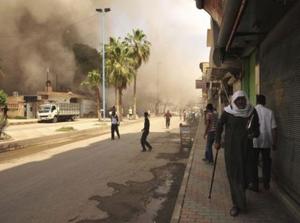SyriaHeavy Israeli air strikes near Damascus destroy Iranian missile shipment to Hezbollah
Israel launched heavy airstrikes Friday and Sunday on a military base near Damascus, destroying shipments of sophisticated Iranian Fateh-110 missiles to Hezbollah. These were the second and third such strikes in as many months. Israel’s first strike on Syrian targets took place on 30 January. That strike destroyed advanced SA-17 surface-to-air missiles the Assad regime was trying to ship to Hezbollah on orders of Iran.

Smoke rises from site of Israeli air attack on Iranian missiles // Source: alghad.com
Israel launched heavy airstrikes Friday and Sunday on a military base near Damascus, destroying shipments of sophisticated Iranian Fateh-110 missiles to Hezbollah.
These were the second and third such strikes in as many months. Israel’s first strike on Syrian targets took place on 30 January, and destroyed advanced SA-17 surface-to-air missiles the Assad regime was trying to ship to Hezbollah on orders of Iran. Analysts note that the three strikes make Israel the first outside country to intervene militarily in the Syrian civil war.
The Washington Post reports that Syrian regime spokesmen warned Sunday that the Israeli airstrikes opened the door to “all the options.” The Syrian Foreign Ministry said in a statement that “The Israeli attack on military sites in Syria is proof that there is communication between Israel and the terrorist groups who take their orders from al-Qaeda.” The government uses the term “terrorists” to refer to the anti-regime rebels.
In an indication that Israel regards Syrian threats of retaliation as so much bluster, Prime Minister Benjamin Netanyahu left Israel on Sunday night for a long-planned 5-day official trip to China.
Military analysts in Israel said it was doubtful that Syria would retaliate with any meaningful force because of the risk of Israeli retaliation. The Syrian military has so far been able to cope with a rag-tag coalitions of ill-armed rebels, but it is no match for the Israeli military.
Over the last forty years the Assad family has increasingly turned the Syrian military into a national militia aimed at policing the country and suppressing political opposition, in the process considerably degrading the military’s fighting capabilities. Assad continued to buy air defense systems from Russia, and, with Iranian support, added thousands of missiles of various ranges to his inventory, but otherwise the major components of his military – tanks, armored vehicles, airplanes, ships, artillery, etc. — have been allowed to degrade.
Israel did take a few precautionary measures, though: the airspace over northern Israel has been closed to civilian traffic, and two Iron Dome batteries have been moved to areas near the border.
With the Assad regime weakening, Iran is seeking to bolster the military capabilities of its other regional allies, chief among them the Shi’a organization Hezbollah. One way to do so is to transfer sophisticated weapon systems – some of them built and paid for by Iran — from the Syrian arsenal to the hands of Hezbollah.
Israel has let it be known that there are four weapon systems it would not let Iran and Syria ship to Hezbollah:
- Chemical weapons
- SA-17 air defense missile systems (a shipment of SA-17 missiles to Hezbollah was destroyed in the 30 January airstrike)
- Russian-made P-800 Yakhont surface-to-sea missiles with a 186-mile range – missiles which could hit Israel’s new natural gas platforms in the Mediterranean Sea
- Upgraded versions of Iranian medium-range Fateh-110 ballistic missiles, or the m600s, which is the Syrian version of the Fateh-110 (the target of both the Friday and Sunday airstrikes)
“This [Fateh-110 missiles] is the weapons system they [Israel’s military leaders] do not want to be in Hezbollah’s hands,” said Gen. (Ret.) Amos Yadlin, a former head of the Israel Defense Forces (IDF) military intelligence directorate and now director of the Tel Aviv-based Institute for National Security Studies.
Yadlin, speaking in Israeli TV, noted that the Fateh-110 missiles destroyed on Friday and Sunday are far more accurate than the Scud missiles and earlier versions of the Fateh missile which that Hezbollah has in its arsenal.
Yadlin added that Israel made the strategic assessment that Syria would not retaliate. “Syria will not react because they know they are in danger from the opposition, and if they start a conflict with Israel, then the military balance will mean them losing some power,” he said.
Iran and Syria have been supplying weapons to Hezbollah for years, “But Israel’s concerns now are heightened because there is a huge stockpile in Syria,” said Brig. Gen. (Ret.) Mike Herzog, former chief of staff to Israel’s defense minister. “And although everyone is focused on chemical weapons, there are many state-of-the-art weapons that could cause huge damage and could fall into the arms of Hezbollah,” he said.
